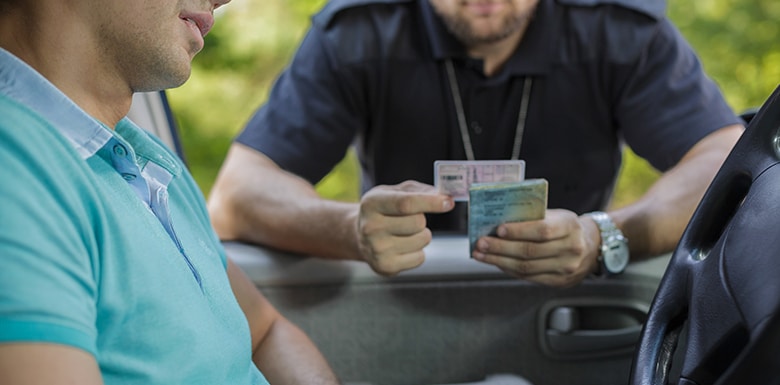Can Police in Ohio Search Your Phone During a Traffic Stop? There is nothing worse than getting pulled over by the cops. So if you ever get pulled over for traffic in Ohio, knowing your rights can keep you calm and protect your privacy.
The most common question is whether the police can search your phone when they pull you over for speeding. There is lots of personal information carried on cell phones, so being informed about how the laws treat phone searches is very important.
We’re going to explore the Ohio rules governing searches of cell phones during traffic stops in this blog post.
We will discuss the Fourth Amendment’s defense against unreasonable searches and seizures, the concept of consent, and instances in which police may search your phone without a warrant.
We’ll also let you know what to do if police want to search your phone and how to protect your privacy during traffic stops.
The Fourth Amendment and Search Warrants: Laying Down the Legal Standard
The US Constitution’s Fourth Amendment defends people against unreasonable searches and seizures. This generally means the police must have an order to search your stuff, such as your phone.
A warrant is an order from the court issued after a judge reviews probable cause. Probable cause is evidence that you committed a crime.
Can Ohio Police Search Your Phone During a Routine Traffic Stop?
The short answer is almost always no. The Riley v. California Supreme Court case in 2014 established that cell phones are personal possessions that hold a high interest in privacy. As such, the police cannot look through your phone without a warrant under normal circumstances for a traffic stop.
Consent Means Choice: You Are Allowed to Decline
You can decline a search of your cell phone, even if the officer requests your consent. It is okay to say something as simple as: “I respectfully decline your request to search my cell phone.” Police officers cannot compel you to allow them to search your property.
Exceptions to the Warrant Requirement: When Can Police Search Your Cell Phone?
There is very little that police can do without a warrant when it comes to searching your phone, such as stopping you for speeding. The exceptions are rather few and exceptional, usually requiring specific conditions to be met. Here’s a list of the most common ones:
Search During Arrest: If you are lawfully arrested for a crime, the police can search you and the surrounding area for weapons or evidence that has to do with the arrest. Your phone could be in this if it is in your pocket.
Plain View Doctrine: This doctrine holds that cops can seize evidence that is in plain sight and obviously contraband.
Say a police officer feels that he can see illegal drugs on your phone screen while you open it. They may take the phone since it would be easy for them to see.
Important Circumstances: Exception. Very rarely, if someone is getting injured or evidence is going to be destroyed. The cops can search your phone, and there is no need for a warrant. Such an exception is used only in specific situations and requires a concrete reason.
What to Do When a Police Officer Asks to Search Your Phone After Stopping Traffic
The moment that you are pulled over by the police, and they ask to check your phone, do this:
- Know what your rights are: Remember that you do not have to permit the police to search you.
- Politely Decline: Be very clear and polite about what you’re saying.
- Maintain Your Cool: Do not debate or fight.
- Get a Lawyer: If you do not feel safe or the situation becomes worse, ask to speak with a lawyer.
Remember:
- You don’t have to tell the officer why you do not want to be searched.
- Silence is not consent. This is not an agreement if you don’t answer the officer’s question.
- You can change your mind at any time during the search.
When to Ask for a Lawyer
If the police officer continues to try and persuade you to submit to a search after you have respectfully declined, you should ask for a lawyer. Under the following circumstances, it would also be wise to ask for a lawyer:
He says you are doing something wrong. Perhaps they saw something on your phone that led them to arrest you, or worse, charge you. Having a lawyer present can go a long way in protecting your rights and making sure that you do not say something that might be used against you.
The Police Want Your Phone: If the officer wants your phone but hasn’t gotten a warrant, a lawyer can assist you in determining the next steps, and perhaps challenge the seizure.
It scares you or you just don’t know what to do: You are unsure of your rights or the scenario, talking to a lawyer can help.
Even though knowing your rights is important, there is much you can do to keep data on your phone safe. Two important things to think about are:
To lock your phone, you should always use a strong password or PIN. This makes it harder for people to get to your info without your permission and is an extra layer of security.
Encryption: You may want to encrypt the information on your phone. Without a decryption key, you cannot read what’s on your phone because encryption scrambles it. This can help you maintain your information safe in case someone takes away your phone.
Keep in mind: encrypting your phone may cause it to open slower. If the police officer believes you are attempting to hinder an investigation by locking up your phone at that moment, it could result in more questions.
Conclusion: Preserving Your Privacy During Traffic Stops in Ohio
If you value your privacy in Ohio, you need to know your rights and how the law works when police search your cell phone during a traffic stop.
Keep in mind that just because the police may want to search your cell phone, you do not have to let them.
Following the tips above and keeping your phone safe will assure you of safety during traffic stops, and your personal information will be safe from hackers.


 by
by 




